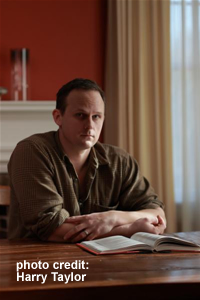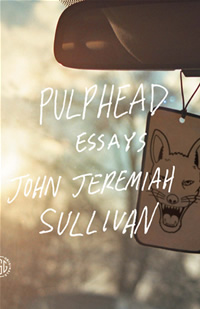In the spring of 2010, when Lorin Stein (the editor of bestselling books by Roberto Bolaño and Richard Price, among others) left Farrar, Straus and Giroux to run The Paris Review, one of his first moves was to create a heretofore unheard of position: Southern Editor. He made this change before putting the venerable magazine’s entire cache of interviews—fifty-plus years of conversations with literary lions like Ernest Hemingway and Gertrude Stein—online. He made it before he redesigned the website or commissioned any stories, and well before he had finished settling into his new Tribeca office. Stein didn’t invent this one-of-a-kind regional editorship because of any longstanding loyalty to the South, but because he counts John Jeremiah Sullivan, the man for whom he created it, one of his favorite living writers.
Stein is not alone in this opinion. According to a recent review at NPR, “Sullivan might be the best magazine writer around.” “Is John Jeremiah Sullivan the New Tom Wolfe?” asks a headline in Time. (“Yes. Yes He Is,” the headline answers itself.) Sullivan, according to The New York Times Book Review, “can take pretty much anything you never thought you’d want to read about respectably (Axl Rose, “Real World”) or anything you never thought you’d want to read about at all (a Christian-rock festival, long-forgotten naturalist loons), and make of it the sort of essay-world you just want to dwell inside.”
 The centerpiece of the first issue of The Paris Review edited by Stein is Sullivan’s, and it’s included in Pulphead, Sullivan’s new collection of essays published by—guess who?—Farrar, Straus and Giroux. “Mister Lytle: An Essay” recounts the period of Sullivan’s life when he lived in the basement of a house owned by the legendary writer Andrew Lytle, the last of the twelve Agrarians. Sullivan was between stints as a college student at the University of the South in Sewanee in 1995, and Lytle was ninety-two. Their relationship started as that of mentor and student, but it developed (or slipped) into something more casual. Sullivan took care of Lytle, whose health was deteriorating, and Lytle gave Sullivan advice on both writing and life that would take him years to fully appreciate:
The centerpiece of the first issue of The Paris Review edited by Stein is Sullivan’s, and it’s included in Pulphead, Sullivan’s new collection of essays published by—guess who?—Farrar, Straus and Giroux. “Mister Lytle: An Essay” recounts the period of Sullivan’s life when he lived in the basement of a house owned by the legendary writer Andrew Lytle, the last of the twelve Agrarians. Sullivan was between stints as a college student at the University of the South in Sewanee in 1995, and Lytle was ninety-two. Their relationship started as that of mentor and student, but it developed (or slipped) into something more casual. Sullivan took care of Lytle, whose health was deteriorating, and Lytle gave Sullivan advice on both writing and life that would take him years to fully appreciate:
For half a year we worked steadily, during his window of greatest coherence, late morning to early afternoon. We read Flaubert, Joyce, a little James, the more famous Russians, all the books he’d written about as an essayist. He tried to make me read Jung. He chopped at my stories till nothing was left but the endings, which he claimed to admire. A too-easy eloquence, was his overall diagnosis. I tried to apply his criticisms, but they were sophisticated to a degree my efforts couldn’t repay. He was trying to show me how to solve problems I hadn’t learned existed.
When Lytle died, shortly after Sullivan moved out, Sullivan helped to build his cedar coffin.
There are funnier and equally stellar pieces in this collection, but “Mister Lytle: An Essay” is the one most likely to knock you out. And it’s the one, unsurprisingly, that has the best ending of all. It won a 2011 National Magazine Award for best essay and criticism, garnering—for Sullivan, for The Paris Review, and for Stein—further respect. Stein had recruited Sullivan, and Sullivan had hit a home run. Readers, if they weren’t already fans of his essays in magazines like GQ and Harper’s, began to take notice.
 These essays cover so many different topics it’s difficult to describe all of them and impossible to convey their spirit. “Upon This Rock,” the first and perhaps most hilarious one, recounts Sullivan’s coverage of a Christian rock festival in rural Pennsylvania, to which he arrived in a rented RV “that looked like something the ancient Egyptians might have left behind in the desert.” Another, ”Feet in Smoke,” tells of the time Sullivan’s older brother, electrocuted by a microphone, died and was brought back to life. “Peyton’s Place” details why and how Sullivan rented out his own home in Wilmington, North Carolina, as a set for the high-school-centered television show One Tree Hill.
These essays cover so many different topics it’s difficult to describe all of them and impossible to convey their spirit. “Upon This Rock,” the first and perhaps most hilarious one, recounts Sullivan’s coverage of a Christian rock festival in rural Pennsylvania, to which he arrived in a rented RV “that looked like something the ancient Egyptians might have left behind in the desert.” Another, ”Feet in Smoke,” tells of the time Sullivan’s older brother, electrocuted by a microphone, died and was brought back to life. “Peyton’s Place” details why and how Sullivan rented out his own home in Wilmington, North Carolina, as a set for the high-school-centered television show One Tree Hill.
No matter the vast differences in subject, two things are consistent. One is Sullivan’s voice, dropping in personal memories and conclusions, compelling enough to take the reader anywhere. Even his terrific profile of Guns N’ Roses frontman Axl Rose, an article that in someone else’s hands might have turned out, at its best, to be a mildly interesting puff piece, is a major accomplishment.
The other consistent feature of these essays is Sullivan’s focus on the South. In a September interview with Publisher’s Weekly, Sullivan said, “My fixation is Southern Enlightenment: times and places when the South has gone against the country’s low expectations of it and offered up sources of inspiration.” He has a penchant for oddity, for characters and situations that stay with you long after you’ve finished reading. In this collection Sullivan demonstrates a superb ability to find the absurd in the mundane, and to tease out overlooked details that not only bring his subjects to life but also illuminate the human condition.
John Jeremiah Sullivan will read from and sign copies of Pulphead at The Booksellers at Laurelwood in Memphis on November 5 at 1 p.m. He will also read in Nashville on November 19 at 1 p.m. at the Nashville Public Library. Both events are free and open to the public.
Tagged: Nonfiction





